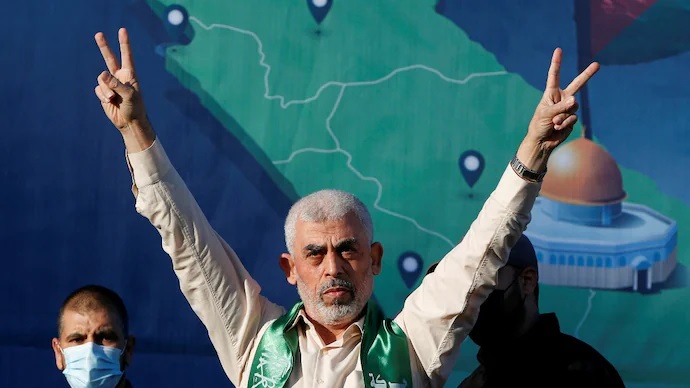According to a media report, Israel is currently conducting an investigation into the possibility that Yahya Sinwar, the leader of Hamas, was killed in a rocket strike that struck a school in Gaza City that was housing displaced Palestinians on Saturday. The Israeli military claimed that the attack was directed at a Hamas command centre; however, Palestinian health authorities reported that the 22 individuals killed in the strike included women and children.
The Times of Israel reported on Sunday that officials were investigating the possibility of Sinwar’s death in response to military intelligence, as reported by Israeli journalist Ben Caspit.
The Shin Bet has rejected the report and maintains that Sinwar is alive, according to the Walla news site. Sinwar was killed during IDF operations in Gaza, according to the intelligence under investigation, the news report stated.
The Times of Israel further stated that Caspit posited that Sinwar’s death may not be confirmed based on his history, which includes his disappearance following previous strikes and the emergence of rumours regarding his death.
In response to rumours regarding Sinwar’s death, Israeli journalist Barak Ravid stated in a post on X that officials with direct knowledge have informed him that Jerusalem lacks the information necessary to confirm the Hamas leader’s death.
Yahya Sinwar, the mastermind behind the October 7 attacks on Israel, assumed the role of Hamas chief in August of this year following the assassination of his predecessor, Ismail Haniyeh, in an explosion in Iran.
Sinwar, who was born in 1962, was an early member of Hamas, which was established in 1987. He served as the head of the militant group’s security apparatus, which was responsible for expelling Israeli spies from the organisation.
In the late 1980s, Israel apprehended him, and he confessed to the murder of 12 suspected collaborators. This action earned him the moniker “The Butcher of Khan Younis.” Ultimately, he was sentenced to four life sentences for his crimes, which included the murder of two Israeli personnel.
Sinwar organised protests in prison to improve the working conditions. In addition, he focused on the study of Israeli society and Hebrew.
He survived brain cancer in 2008 as a result of treatment by Israeli physicians.
In 2011, Prime Minister Benjamin Netanyahu released him from prison in exchange for an Israeli soldier who was captured by Hamas during a cross-border raid.
The surprise attack on Israel on October 7 is suspected to have been orchestrated by Sinwar and Mohammed Deif, the leader of Hamas’s armed wing.
The attack resulted in the deaths of 1,200 Israelis, the majority of whom were civilians, and sparked a war that resulted in the deaths of over 40,000 Palestinians in Gaza.
